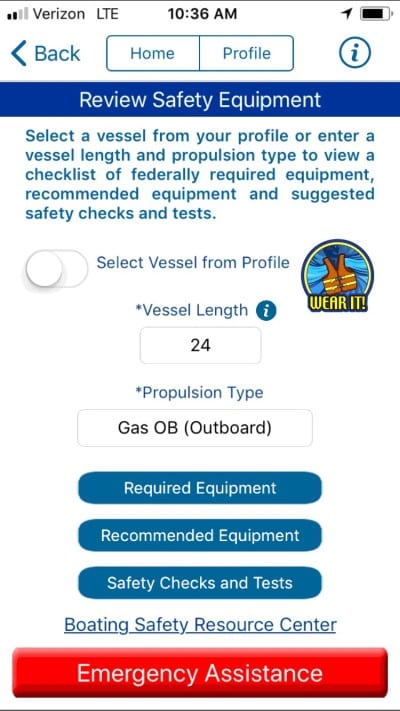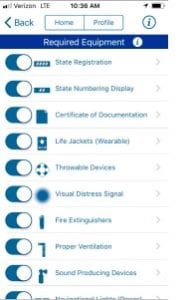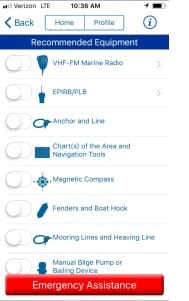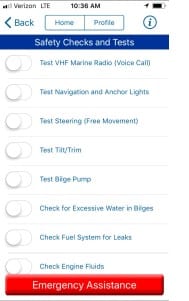 By Bob Currie, Vessel Examiner
By Bob Currie, Vessel Examiner
United States Coast Guard Auxiliary Flotilla 081-06-08
How many times have you loaded up your boat, launched, and headed out to your favorite spot only to realize you have forgotten your bait/fishing rod/tackle box/life jacket/drinking water, or any other important item required to make the trip successful? You need to know your vessel, plan the trip, and avoid inconvenience and potential danger by taking a few minutes to ensure that you have what you need. The best way to do that is to have a pre-departure checklist. The best start to creating your list is to review the items that are both required and recommended on the Coast Guard Vessel Safety Check.
Flotilla 081-06-08 is based at Coast Guard Station Galveston. The Coast Guard Auxiliary is the uniformed civilian component of the US Coast Guard and supports the Coast Guard in nearly all mission areas. The Auxiliary was created by Congress in 1939. For more information, please visit www.cgaux.org.
Vessel Safety Check
The best way to ensure that you have what you need is to undergo a free Coast Guard Vessel Safety Check (VSC), but even if you haven’t done this, you can take advantage of the safety check by adding the required and recommended items to your own list. You may also access the Coast Guard app and select the “Review Safety Equipment” icon.
- State Registration (Certificate of Number)- available onboard
- State Numbering- properly spaced on both sides (TX 1234 AA or TX-1234-AA)
- Life Jackets- Coast Guard approved; one for each person onboard
- Throwable Type IV Device- immediately available when underway
- Visual Distress Signals- Coast Guard approved day and night signals
- Fire Extinguisher- Coast Guard approved; not expired; fully charged
- Proper Ventilation- check operation (inboard and inboard/outboard engines)
- Backfire Flame Control- tightly fitting (inboard and inboard/outboard engines)
- Sound Producing Device- horn or whistle (mother-in-laws are not approved)
- Navigation Lights- make sure they work
- Oil Pollution Placard- (boats 26 feet and longer)
- Garbage Placard- (boats 26 feet and longer)
- Marine Sanitation Device- required for boats with installed toilets
- Copy of Navigation Rules- (boats 39.4 feet and longer) may be electronic copy
- Any Additional State Requirements- (use your Coast Guard app to review)
- VHF-FM Marine Radio- make sure it operates when turned on
- Personal Locator Beacon (EPIRB or PLB)- for offshore trips
- Anchor and Line- check for deterioration
- Charts of the Area and Navigation Tools- Sonar/GPS operates when turned on
- Magnetic Compass- backup if GPS fails
- Fenders and Boat Hook- rough water can make approaching the dock hazardous
- Mooring Lines and Heaving Line- coiled and stored
- Manual Bilge Pump or Bailing Device- in case you lose all power
- Tool Kit- basic tools to make simple repairs
- Spare Parts- fuses, spark plugs, belts, etc.
- Spare Battery- fully charged; trolling motor battery works in an emergency
- Spare Propeller/Shear or Cotter Pins- things happen; be prepared
- Extra Fuel and Oil- remember the 1/3 tank out- 2/3 tank to get back in rule
- Alternate Propulsion- paddle or oar; if you lose power: anchor immediately
- Flashlight and Batteries- even though you are making a daylight trip
- Search Light- same reason as above
- First Aid Kit- be able to stop bleeding if necessary; things happen out there
- Sunscreen (SPF 30+)- Sunburn can lead to more severe heat-related conditions
- Mirror- used for signaling in an emergency
- Food and Water- a day on the water can dehydrate you and sap your energy
- Binoculars- not just for looking for the birds working; can save your life
- Test VHF Marine Radio- call a nearby friend on a non-emergency channel
- Test Navigation and Anchor Lights
- Test Steering for free movement
- Test Tilt/Trim
- Test Bilge Pump
- Check for Excessive Water in Bilges- once boat is in the water
- Check Fuel System for Leaks- rubber hoses deteriorate in salt air
- Check Engine Fluids- low oil can cause overheating
- Ensure Boat Plug is properly installed- easy to forget
- Check Electrical System- any corrosion on the battery posts can strand you
- Check Fuel Amount- can you get back home?
- Ensure Anchor is Ready for Use- attached to cleat and properly stowed
- Check Load of Vessel and Secure Gear
- Ensure Passengers Know Emergency Procedures and Equipment Location
- Check that all Life Jackets Fit Properly
- Check the Weather Forecast
- File a Float Plan with Relative or Friend
You can also download a Pre-Departure Checklist from the Coast Guard website at www.uscgboating.org . Your Coast Guard app can help you with your checklist. You can tailor the checklist to your boat and save it within the app.

For more information on boating safety, please visit the Official Website of the U.S. Coast Guard’s Boating Safety Division at www.uscgboating.org. Questions about the US Coast Guard Auxiliary or our free Vessel Safety Check program may be directed to me at [email protected]. I am available to perform free Vessel Safety Checks, and I will come to your location to perform them. SAFE BOATING!
[4-16-2018]




 Posted in
Posted in 























